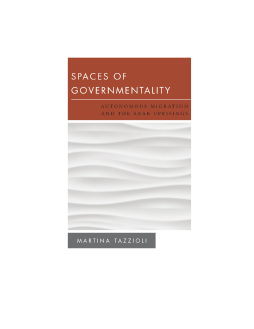
Additional Information
Book Details
Abstract
Much work has been done on the causes and characteristics of the Arab Spring, but relatively little research has examined the political and spatial consequences that have developed following the uprisings.
This book engages with the ways in which spaces in Southern Europe and Northern Africa have been negotiated and transformed by migrants in the wake of the uprisings, showing that their struggles are a continuation of their political movement. Drawing on an innovative countermapping approach, based on radical cartography, Martina Tazzioli illustrates the spatial upheavals caused by migration in the Mediterranean and the transformations created by migration controls applied by European nations. With critical insight on the application of Foucault’s concept of governmentality to migration studies, exploration of a reconfigured theory of autonomy of migration and discussion of the politics of invisibility that underpins migration, this book sheds new light on the enduring struggles that follow the Arab Spring.
Spaces of Governmentality is an exciting and important critical intervention into the study of borders and migration, positively overflowing with a vibrant new repertoire of concepts, images, and imaginations. Tazzioli’s refreshing analysis is strategically aligned with the unsettling disruptions and turbulence generated by the volatile and sometimes subversive force of the Tunisian revolution, particularly as manifested in the indisciplined aspirations and incorrigible desires of Tunisians whose mobility defied the European border regime and all of its governmental categories for “managing” migration and asylum-seeking. By means of a close and sensitive tracking of this counter-power of the autonomous movements and struggles of Tunisian migrants, Tazzioli provides us with a counter-mapping that is as politically daring as it is intellectually subtle.
Nicholas de Genova, Reader in Urban Geography and Director of Cities Research Group, Department of Geography, King's College London
This is a unique work. I know of few other books in the booming field of migration studies that are as deeply philosophical in their outlook, as politically astute in their criticism, and as carefully situated in a given conjuncture - in this case the Arab uprisings and their reverberations within the field of human mobility - as Spaces of Governmentality. When it comes to the politics of migration today the threshold of the intolerable remains too high. Tazzioli's impressive book will be an ally to those struggling to lower it.
William Walters, Professor at the Department of Political Science and the Department of Sociology and Anthropology at Carleton University
Martina Tazzioli is a postdoctoral researcher at the University of Oulu, Finland. She holds a PhD in Politics from Goldsmiths University of London, UK. She is co-editor of ‘Spaces in Migration’ (2012) and ‘Foucault and the History of our Present’ (2014).
The book eschews the traditional frameworks for speaking about migration … Spaces of Governmentality is an excellent example of how governmentality does not have to be studied in the grey world of repetitive acts of governance, with its propensity to highlight the power dynamics coming from state, institutional or otherwise dominant power networks. In this book, freedom and control exist in an immanent field of encounter, interrelation and struggle.
Investigating practices of migration in the Mediterranean in the wake of the Arab uprisings, this book destabilizes governmental cartography of migration and unsettles our mental and geographical maps. It speaks of migration, borders, and the Mediterranean, but it also compels us to rethink the politics of autonomy.
Sandro Mezzadra, Department of Political and Social Sciences, University of Bologna and co-author of co-author of Border as Method, or, the Multiplication of Labor
“Adopting the most accomplished theoretical framework, Tazzioli’s militant research embarks innovatively in a process of counter-mapping used to identify cartographic practices that challenge governmental maps on migration.”
Tazzioli offers a refreshing analysis of the contradictions of the mainstream narrative of the Arab uprisings as a delayed march toward freedom. Her original insights reveal that European applause of the Tunisian democratic revolution was soon replaced with a profound anxiety about people leaving Tunisia for Europe in order to exercise their newly found freedoms. She provides different snapshots of movements from and into Tunisia in the aftermath of the uprising: Tunisians wanting to travel in Europe without hindrance, Eritreans protesting their treatment in an isolated Italian island, Syrians stopped in the French city of Calais, and third-country nationals escaping from Libya only to be stranded in a desert camp in Tunisia. She builds on Michel Foucault’s notion of governmentality to offer a critique of the European migration regime characterized by illiberal practices of detention and deportation. Her criticism of using the country of origin to distinguish between ‘legitimate’ asylum seekers and ‘illegitimate’ economic migrants is especially compelling. . . .Summing Up: Recommended. Graduate and research collections.
